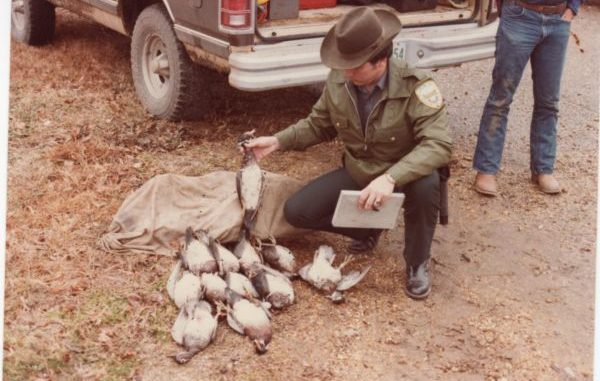
A different way to discourage poaching
Wildlife enforcement agents don’t follow every case as it works it’s way through the justice system. Penalties for minor offenses such as fishing without a license or the various boating infractions are usually handled as bond forfeiture or a fine amount listed in the statute: The offender pays the fine to the sheriff’s office in the parish where the offense occurred, and that’s the end of it.
More-serious offenses involve the district or U.S. Attorney’s Office and the courts, and are usually handled in one of three ways.
The offender might agree to a deal with the district attorney before any court appearance. The prosecutor might reduce or drop some charges in exchange for a guilty plea.
This is sometimes called a “pre-trial intervention,” where the offender (with court approval) agrees to pay the fines and comply with terms set forth in the deal.
The offender appears at arraignment, the day he is summoned to court to enter a plea. At arraignment, the charges set by the prosecuting district or U.S. Attorney are read into the record, and the judge or magistrate asks the accused how he or she wishes to plead.
If a guilty plea is entered, the judge might sentence the offender at that time or may order a presentence investigation, bringing the offender back to court at a later date for sentencing.
If the offender pleads not guilty, a trial date is set.
In cases where the accused is found guilty, the presiding judge hands down sentence. When the sentence includes probation conditions or requirements that depart from the usual fines and jail terms prescribed in the statute, we call this innovative sentencing.
Wildlife agents do track these more-serious cases, and are frequently subpoenaed to court for arraignments or trials. When a defendant is to be placed on probation, agents are sometimes asked for recommendations for terms of the probation. The prosecuting attorney submits such recommendations to the judge for consideration during sentencing.
Innovative or unusual sentencing, in my opinion, is a good alternative to placing misdemeanor offenders in over-crowded jails, and more importantly it might modify illegal and unacceptable behavior.
The reader might be asking “How so?” Well, consider some of the sentences handed down for fish and wildlife violations.
Offenders who have never attended hunting education courses have been ordered to attend and successfully complete the course. These classes include much more than safe firearm handling.
Hunter ethics are discussed at length, along with respect for private property and good wildlife conservation practices. Anyone willing to accept and consider better conduct in the outdoors will benefit from this course.
In lieu of fines, some violators are ordered to contribute to non-profit outdoor organizations. Louisiana Operation Game Thief Inc. has benefitted from court-ordered donations from offenders.
If he learned nothing else, the violator now knows money might be made from reporting illegal activity, something he might think about before committing another offense. Or better yet, he might report his outlaw buddies who continue to break the law as a way to recoup his losses in fines.
Other outdoor organizations such as Ducks Unlimited, Delta Waterfowl, The National Wild Turkey Federation and The Black Bear Conservation Committee can benefit from court-directed contributions and provide species conservation education to those who need it most.
Innovative sentencing has also included specialized community service. Judges have ordered offenders to serve community service hours on wildlife management areas and refuges where they perform a variety of tasks. They have planted trees, cleaned up litter, repaired damage from vandalism and many other chores. During the process they spend time with fish and wildlife professionals, learning and better understanding what they do and how it benefits wildlife.
Court-ordered community service might just be the best innovative sentencing requirement of them all.
Litter and vandalism are significant, expensive and chronic problems on WMAs, refuges, public shooting ranges and boat landings. Court-mandated cleanup work is a great benefit to any agency managing publicly owned property, helping to stretch lean budgets by reducing maintenance costs.
In addition, anyone putting in a lot of hard work cleaning up trash and repairing senseless damage might gain a better appreciation for public wildlife areas. And hopefully they won’t hesitate to turn in anyone seen destroying all that hard work.
Requirements of innovative sentences have even included public speaking as a community service. Convicted poachers have been ordered to address hunter education classes or students at local schools. The offender owns his crime and talks about the consequences in an effort to discourage illegal conduct by young hunters and fishermen.
U. S. Fish and Wildlife Service Special Agent Dave Hall effectively used court-ordered video-recorded discussions with convicted offenders to combat poaching and alert people to the damage inflicted on wildlife.
The gold standard of innovative sentencing has long been the loss of hunting and fishing privileges. Hunting and fishing revocation seems to be dreaded by offenders more than fines or jail terms.
Given the passion of outdoorsmen, legal or otherwise, it is understandable. I recall one case where a violator had lost his hunting privileges for two years. An agent had found him in the company of either family or friends on a hunting trip. Not hunting he claimed, just along to be with the group and share the day.
The agent reported the incident to the probation officer, who hauled the offender into court on this probation violation. I happened to be in court that day on another case and heard the judge as he made the conditions of the probation crystal clear: There was to be no tagging along on hunts, no riding in the vehicle, no sitting in the boat, not even visiting the camp. The guy had tears in his eyes, and hopefully chose a better path when his probation ended.
Anytime the subject of penalties in wildlife cases comes up in conversation, someone will invariably relate a he said/she said, I heard about someone getting caught and losing truck, boat, guns and everything else.
In truth, forfeiture of equipment is rare. It does happen in extreme cases, but not nearly as often as that mythical tale is told.
But effective and innovative sentencing is a reality, and every outdoorsman should support it. One of the most important things we can do as citizens and conservationists is to let the district attorneys and judges know we support vigorous prosecution of outdoor outlaws.


